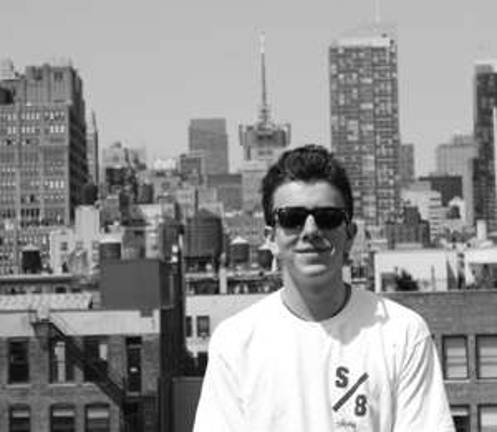Bard of the Teenage Set

Max Friedlich, 17, is the youngest playwright at this year's Fringe Fest. By Mayara Guimaraes As the youngest playwright at the New York International Fringe Festival, Max Friedlich, 17, son of media executive Jim Friedlich and artist Melissa Stern, capably wrote SleepOver, about two teens who live in New York and are dealing with issues of age, race and love. Friedlich trained at the New York Theatre Workshop, The Wayfinder Experience, the New Acting Company, HB Studio and Stephen Sondheim's Young Playwrights Program. SleepOver played to a packed house Aug. 12 at Cherry Lane Theater and will continue through Aug. 25. The playwright sat down with Our Town to discuss writing for his generation and prepping for the Fringe Fest. OT: What are the ups and downs of being such a young playwright? MF: It's been difficult at times. It's a balancing act because I am relatively inexperienced and sometimes I do need things explained to me. Other times people assume that I can't handle things or that they can neglect my opinion because I'm young. In general people seem to respect the play and what it stands for. My cast-family is just that: a family. Did you face much criticism? Not really. My mom is my biggest critic. She's always incredibly honest with me, and she is harsh when she needs to be. I trust her with my work more than anyone. Sometimes when I've done readings of the play, people give me ridiculous critiques, my favorite being "Why is this a play?" That one made me laugh. Lots of haters out there. What kind of preparation went into preparing the play for the Fringe Festival? In any writer-director marriage there's going to be a constructive push and pull. My director, Dann Fink, had questions about stuff in the play. Some of it I agreed to change and some of it I fought for, and it all worked out beautifully. There are slang terms my parents' generation wouldn't get at first hearing, so we gave the task to the actors to convey the required meaning. Because of the time constraints of Fringe, I cut the play by 30 pages. That was a blessing in disguise because it made the play stronger and faster-paced. You've said you feel your generation's voice, humor and concerns have never been well articulated on stage. How would you define your generation? I would define my generation as everyone who grew up Googling things if they had a question. I want to represent two groups: New York City kids and teenagers in general. Kids from NYC have a unique way of talking and a unique way of living. We're our own thing. There's nothing like us. Adults tend to project their teenage experiences onto teens, which make sense, but theatrically it's not relevant. Kids express themselves differently than they did 20 years ago. My problem with how I see teenage life portrayed in film and stage is that it's often sung with one note. We come across as sullen and unreasonable and that's definitely part of the experience but it doesn't define us. Tell us about the play ? Matt is a Park Slope kid at a high-pressure private school, living with his mom Jasmine. Theo is a black kid at his school, and one day he shows up at Matt's brownstone. From a plot standpoint that's all I want to say. Trust me. Stuff goes down. I'll let it be a surprise. To me the play is about love and loss, parents and children, race and-more than anything-isolation. What are you currently working on? I return to high school as a senior in September. I'm looking forward to getting into college and kicking back a little and enjoying myself. I started my next play, Black Ice, as part of the Powerhouse Apprentice Training Program at Vassar College earlier this summer. I'm also working on a play about how American society looks at rape. That one I'm doing with Eva Ravenal, who's an insanely good writer. That one's going to be strong and genuine.